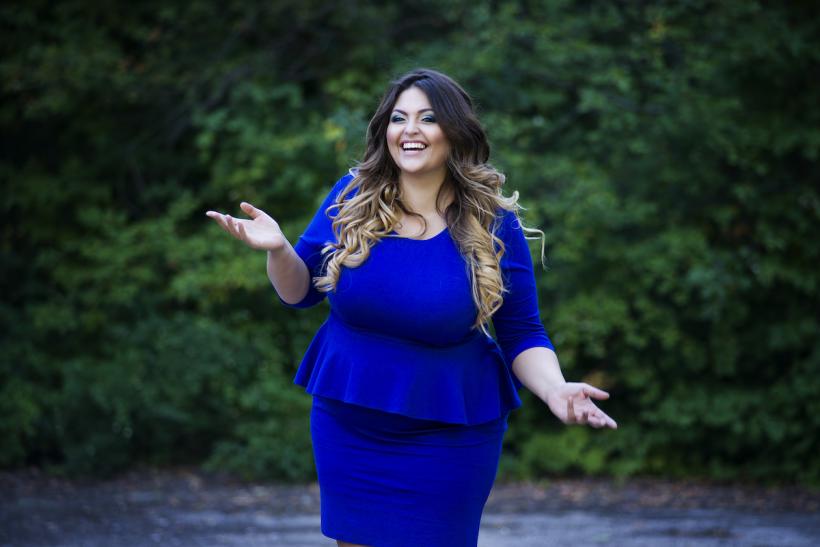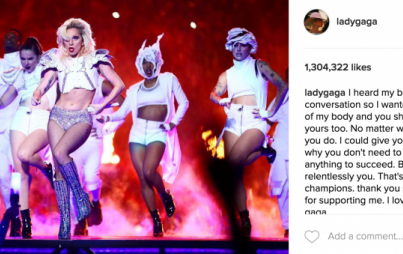
Fat acceptance allows us to free ourselves from diet culture to finally love our bodies!
Recently, The Guardian gifted the world with a piece-of-trash article using the International pastime of bashing fat people who don’t hate themselves. The article, “It’s not fine to be fat. Celebrating obesity is irresponsible,” by “journalist” Lizzie Cernik, demonstrates a complete misunderstanding of the concepts of body positivity and size acceptance and puts forth a blatant double standard based on sizeism, healthism, and ableism.
Let’s break this drivel down.
“Body positivity began as a powerful antidote to the media’s obsession with skeletal models and beachball-breasted glamour girls…But as we move away from the skinny goals of the mid-2000s and embrace different shapes and sizes, one group of campaigners has taken things a step too far. Fronted by plus-sized models and social media influencers, the fat acceptance movement aims to normalize obesity, letting everyone know that it’s fine to be fat.”
Not even close there, Lizzie. Fat acceptance came first. Groups like the Fat Underground started clawing for fat people’s rights to life, liberty, the pursuit of happiness in the 1960s. “Body positivity” is the newcomer, a watered-down version of fat acceptance. BoPo not only inherited the issues of fat acceptance — including a lack of marginalized voices including people of color and disabled people/people with disabilities — but then created more issues by putting limits on who is “allowed” to love their body and who “deserves” to be treated with basic human respect.
Next, we have the tired healthism-as-as-veil-for-fatphobia argument: “While nobody should ever be bullied for their weight or food choices, it’s important to make a distinction between health awareness and cruelty.”
The point of body positivity and fat acceptance is not to tell people what lifestyle choices to make, but to be clear that people of all sizes — including and especially fat people — have the right to exist without shame, stigma, bullying, and oppression.
The problem with this is that “health” is a difficult concept to nail down, especially since research tends to follow the biases (and profitability) of the time. The distinction we need to make between health awareness and cruelty revolves around the perceived risks doctors are willing to make regarding fat bodies. These include the belief that thin people should be given evidence-based interventions for health issues and fat people should risk their digestive health, quality of life, and lives to have a dangerous (and highly profitable) stomach amputation surgeries.
The specific example that Cernik uses is an ad campaign undertaken by Cancer Research UK claiming that “obesity causes” cancer, which has been properly called out as fatphobic. What Cernik leaves out of the discussion is that their research doesn’t support their conclusion. What they found was a correlation, not causation, between body size and cancer. Every first-year research student learns that “correlation never ever, never ever implies causation” but armchair medical professionals like Lizzie and Fatphobe Twitter seem unable to grasp the concept.
Additionally, this doesn’t even take into account the variables (commonalities among fat people) that research doesn’t control for — meaning that based on research, cancer isn’t just correlated to body size, but also to chronic dieting, constant size-based stigma, oppression, and more. Nor does Cernik discuss the fact that the study considered body size to be a “lifestyle factor” despite the fact that people of the same (highly questionable) BMI category don’t necessarily share habits in common. Lizzie also forgot to mention that the research and ad campaign were funded in part by a ten million pound donation from Slimming World, a diet company using Cancer UK’s research heavily in its marketing.
You Might Also Like: How The Spanish Word For "Fat" Helped Me Treat My Body Like A Friend
Now, to be fair I don’t know if Lizzie left these things out on purpose or because she’s simply scientifically illiterate, but either way, it makes her conclusions extremely questionable at best, and disingenuous at worst.
Moving on to this gem of utter ignorance: “Medications, mental health, social deprivation, self-esteem, and genetics all play a role in our ability to control our weight, and judgment is never a constructive approach. But suggesting that being a size 30 is just as healthy as being a size 12 isn’t a body-positive message either — it’s an irresponsible form of denial.”
This is the point in which Cernik loses any shred of creditability that she may have had left. Size is not health. There are healthy and unhealthy people of all shapes and sizes, and suggesting that size and health are inextricably linked is irresponsible. It’s also a fatphobic argument, as health is not an obligation, barometer of worthiness, entirely under our control, or guaranteed under any circumstances.
Cernik wraps up her gift of fatphobic bullshit with this bow: “Whether we want to gorge on 3kg of chocolate, drink until we vomit in the bathtub or line our lungs with carcinogenic tar, informed adults are free to make their own choices. But while your own body is your business, actively encouraging unhealthy lifestyle choices and denying health risks in a public space isn’t promoting body positivity — it’s just giving the green light to different kinds of eating disorders.”
The first sentence may be the only thing she’s said that is true and correct in the entire piece, but she quickly contradicts herself, so I don’t think it counts. Once again, Cernik completely misconstrues the movement to make her argument. The point of body positivity and fat acceptance is not to tell people what lifestyle choices to make, but to be clear that people of all sizes — including and especially fat people — have the right to exist without shame, stigma, bullying, and oppression.
Fat acceptance allows us to free ourselves from diet culture to finally love our bodies (and, for many of us, view them as worthy of care for the first time.) It also frees us to look critically at a medical culture driven by profit and blatant fatphobia.
But here’s the thing. Even if Lizzie was right about weight, size, and health, she would still be wrong because it would still be fine to be fat and celebrate our amazing fat bodies. (Just like it’s ok to be a professional football player and celebrate that, even though it does not prioritize health.) As Cernik points out in her sentence-long moment of lucidity, we each get to choose what to do with our bodies. Loving, appreciating, and celebrating our bodies is never an obligation, but it is always an option.
So if you’re fat, that’s just fine.








